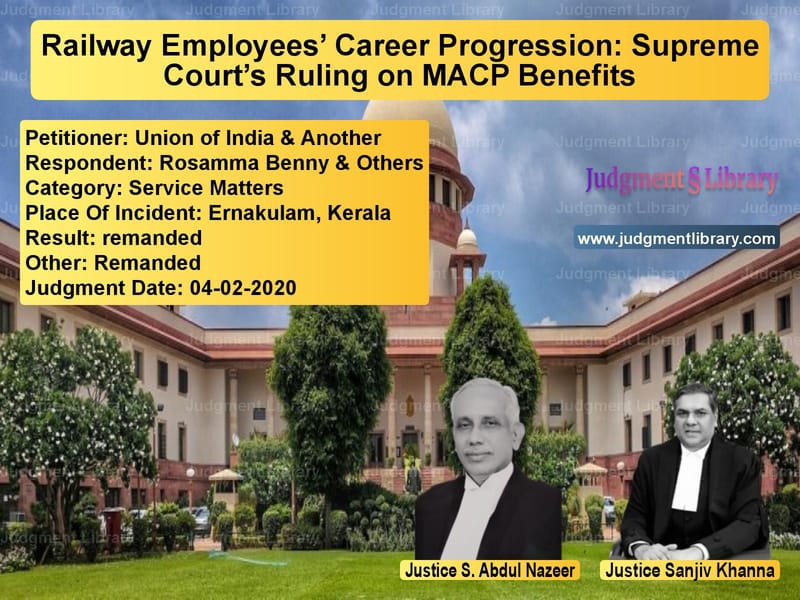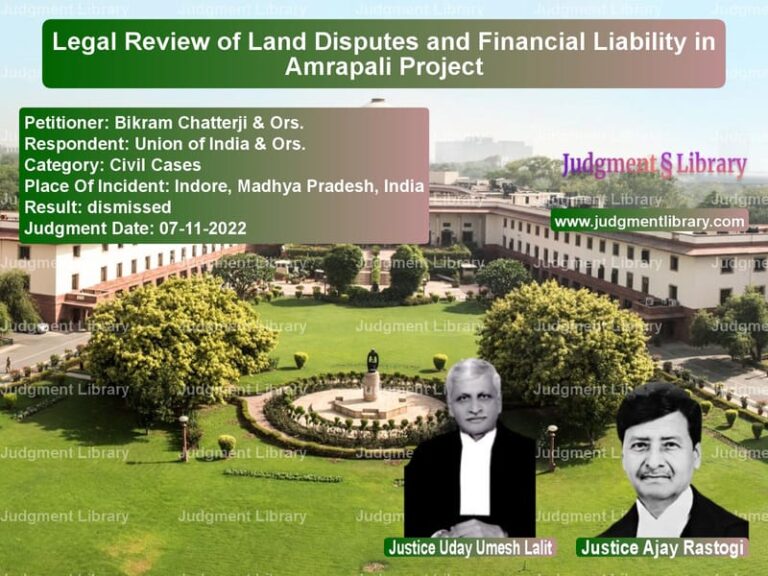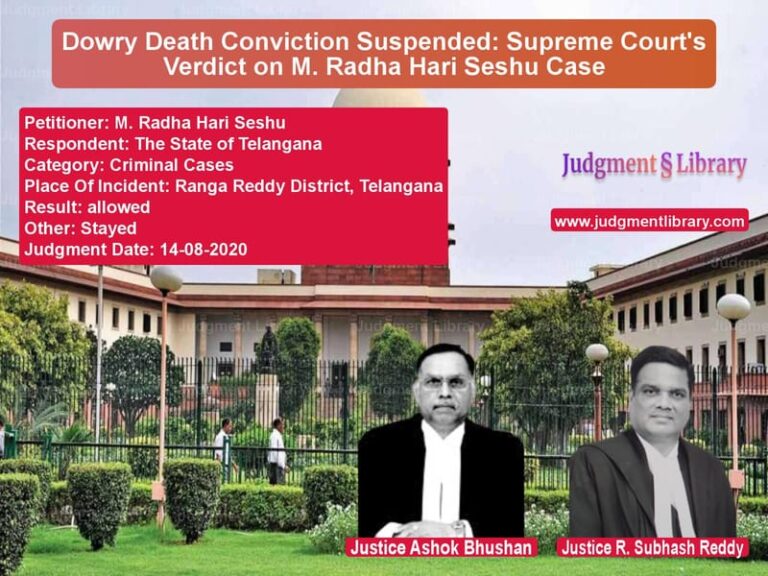Railway Employees’ Career Progression: Supreme Court’s Ruling on MACP Benefits
The Supreme Court of India, in the case of Union of India & Another v. Rosamma Benny & Others, addressed a critical issue concerning financial upgradation under the Modified Assured Career Progression (MACP) Scheme for railway employees. The ruling focused on whether employees promoted through the Limited Departmental Competitive Examination (LDCE) are eligible for MACP benefits.
Background of the Case
The respondents, Rosamma Benny, Jessy S. Babu, and Sreekala P.V., were employees of Southern Railway, working as Enquiry-Cum-Reservation Clerks (ECRC). They had been in the ECRC cadre since November 1, 2003, and sought financial upgradation after completing ten years of service. The claim was allowed by the Central Administrative Tribunal (CAT), Ernakulam Bench, and upheld by the Kerala High Court. The Union of India and the Southern Railway challenged the High Court’s ruling before the Supreme Court.
Key Legal Issues
- Are employees appointed through the LDCE eligible for MACP benefits?
- Does the railway’s policy on career progression align with the general principles of the MACP Scheme?
- Should financial upgradation be granted retrospectively?
Arguments by the Parties
Arguments by the Appellant (Union of India & Southern Railway)
- The respondents were appointed under the promotion quota, and their appointment should not be treated as direct recruitment for MACP eligibility.
- The MACP Scheme applies from the entry-grade post, and employees promoted through LDCE cannot claim financial upgradation as direct recruits.
- The Ministry of Railways’ circular dated 12.09.2012 clarified that promotions through LDCE should be considered as promotions and not as direct recruitment for MACP purposes.
- The High Court failed to consider railway-specific career progression policies.
Arguments by the Respondents (Railway Employees)
- The respondents had continuously served as ECRC for over ten years and were entitled to financial upgradation under MACP.
- The MACP Scheme provides three upgradations at intervals of 10, 20, and 30 years of service, and the denial of benefits violates this provision.
- Their initial service in other positions before becoming ECRC should not affect their eligibility.
- The CAT and the High Court correctly interpreted the scheme in favor of the employees.
Supreme Court’s Observations
The Supreme Court, led by Justices S. Abdul Nazeer and Sanjiv Khanna, examined the matter in light of the MACP Scheme and relevant circulars.
1. Interpretation of the MACP Scheme
The Court observed that MACP benefits should be extended based on regular service tenure, irrespective of promotions through LDCE. The Court noted:
“The MACP Scheme ensures that stagnation in service does not affect the financial growth of employees, and upgradations should be granted fairly.”
2. Clarification of Promotion vs. Direct Recruitment
The Ministry of Railways had issued a clarification stating that LDCE promotions should be treated as promotions rather than direct recruitment for MACP benefits. However, the Court found that the railway policy was ambiguous in implementation.
“If the rules governing ECRC recruitment allow direct recruitment and promotion via LDCE, both categories should be treated equitably for career progression.”
3. Non-Consideration of Essential Circulars by High Court
The Supreme Court criticized the High Court for failing to consider the Railway Board’s clarifications regarding the application of MACP benefits.
4. Remand for Further Inquiry
Since there was no clarity on the factual aspects, the Supreme Court decided to remand the case to the CAT for fresh consideration, directing:
- The CAT should review whether the respondents’ service history aligns with railway policies.
- The Tribunal must examine the impact of pay scale mergers and career progression policies.
- Both parties should submit additional documents if necessary.
Final Judgment
The Supreme Court set aside the High Court and Tribunal’s decisions and remanded the case back to CAT for fresh adjudication.
Key Takeaways
- LDCE promotions do not automatically qualify as direct recruitment for MACP benefits.
- Career progression policies should be implemented consistently across government departments.
- Railway-specific clarifications must be considered before granting financial upgradation.
- Remand to CAT allows detailed examination of service records and policy applicability.
Conclusion
The Supreme Court’s ruling in Union of India & Another v. Rosamma Benny & Others highlights the complexities of career progression policies in government services. By remanding the case for fresh consideration, the Court has ensured a fair assessment of MACP benefits, reinforcing the need for consistency in financial upgradation schemes.
Petitioner Name: Union of India & Another.Respondent Name: Rosamma Benny & Others.Judgment By: Justice S. Abdul Nazeer, Justice Sanjiv Khanna.Place Of Incident: Ernakulam, Kerala.Judgment Date: 04-02-2020.
Don’t miss out on the full details! Download the complete judgment in PDF format below and gain valuable insights instantly!
Download Judgment: Union of India & Ano vs Rosamma Benny & Othe Supreme Court of India Judgment Dated 04-02-2020.pdf
Direct Downlaod Judgment: Direct downlaod this Judgment
See all petitions in Promotion Cases
See all petitions in Public Sector Employees
See all petitions in Recruitment Policies
See all petitions in Judgment by S. Abdul Nazeer
See all petitions in Judgment by Sanjiv Khanna
See all petitions in Remanded
See all petitions in Remanded
See all petitions in supreme court of India judgments February 2020
See all petitions in 2020 judgments
See all posts in Service Matters Category
See all allowed petitions in Service Matters Category
See all Dismissed petitions in Service Matters Category
See all partially allowed petitions in Service Matters Category







